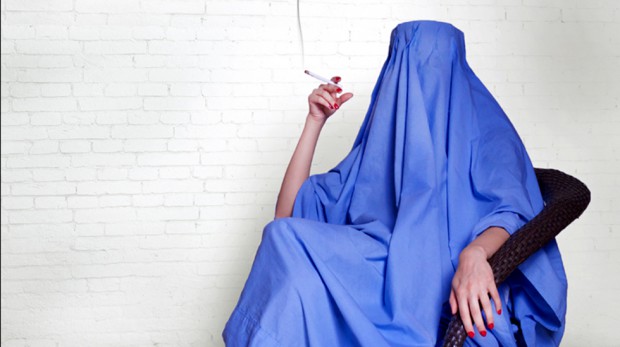
The Blue Room doesn’t shy away from presenting provocative works, and Once We Were Kings by Dure Rey Khan is poised to be the front-runner in provocation this season. The show’s publicity imagery is enough to stir debate in itself: it features a person (male or female?) covered in a bedsheet styled to look like an Afghan-influenced blue burqa, with fishnets, bright red pumps and fingernails, cigarette in hand, sitting in a wicker chair whose arm winds around the person like a snake. It’s a striking image that cuts through the media jungle like a scythe, challenging cultural stereotypes and raising questions as it goes.
The show’s producer/director Mustafa al Mahdi created the image while wearing one of the many hats independent theatre-makers inevitably must and love to wear. “Dure came to me with a very early draft of the script, and she said, ‘I’ve got the script and I need everything else done.’ My role is director/producer but I’m in charge of marketing and branding as well. Really the only reason it’s been manageable is because I’ve got a really great team. Everyone does their role on time and everyone’s been really good. We’ve been lucky,” al Mahdi says.
This is al Mahdi’s first time working as a theatre director, although he has directed film; he says the directing process is different for theatre in that he doesn’t have the luxury of doing take after take to get the result he wants from the actors. “In theatre, I can only give them an in point and an out point. It’s kind of like, I go from home to work every day but sometimes I might stop at a deli on the way, sometimes I might take a different route, but it’s always the same destination.”
The destination of Once We Were Kings seems to be an understanding of what it means to be part of a third culture and a discussion around the process of cultural assimilation. Al Mahdi explains that when migrants come to a new country, there is first a period of doubt and conflict where notions of tradition, religion and custom are challenged as potential contaminants to the dominant culture; then there is a period of epiphany and acceptance where these traditions are no longer seen as contaminants; and finally there is the celebration and empowerment stage between the two cultures.
“I think right now with Muslims and Middle Easterners, we’re at the conflict stage,” al Mahdi says, but he doesn’t seem daunted by the struggle. “It’s great to trigger and be part of that conversation right now while it’s still in its infancy.” But he warns that the show isn’t meant to be taken as a kind of political or religious statement. “Because of its nature and what it’s trying to say, a lot of people think it’s some sort of protest or that it has some sort of underlying religious or political agenda. But really, it is just following the stories of people in the community who have gone through experiences and putting those experiences on stage. Because the queer conversation and the Muslim conversation are in the news, if you do anything, even if it is with an artistic intention, it will be automatically associated with protest.”
In the end he says the show is very classical theatre with a lot of metaphor, poetry and storytelling. ”It’s this huge collage, this very very honest painting of a lot of experiences that have been consolidated into three metaphors of people. The three characters are clusters of experiences, so anyone watching this will identify with at least one of their struggles.”
CICELY BINFORD
Once We Were Kings runs at the Blue Room Theatre until Friday, May 29. For tickets and session times, go to blueroom.org.au.